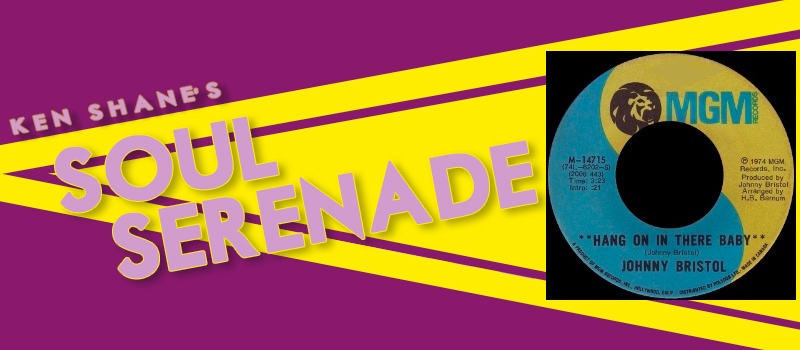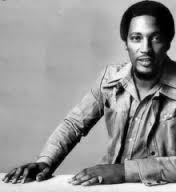 In 1974 Johnny Bristol set the charts alight with his biggest hit, “Hang On In There Baby,” but he traveled a long road to get to that point. Bristol was born in Morgantown, North Carolina in 1939. By his own admission, his show business career began purely by chance.
In 1974 Johnny Bristol set the charts alight with his biggest hit, “Hang On In There Baby,” but he traveled a long road to get to that point. Bristol was born in Morgantown, North Carolina in 1939. By his own admission, his show business career began purely by chance.
In the 1950’s Bristol joined the Air Force, and he was stationed at Fort Custer near Battle Creek, Michigan. There he met a fellow airman by the name of Jackey Beavers. The two men had a common interest in singing, so they decided to form a duo which they called Johnny and Jackey. They played doo-wop shows in the Detroit area, and one night Gwen Gordy, sister of Berry Gordy, was in the audience. She was impressed enough to sign the duo to a management contract.
Gordy had her own label called Anna, and it was that label that released the first two Johnny and Jackey singles, “Lonely & Blue” and “Hoy Hoy,” in 1960. Then Moonglow’s leader Harvey Fuqua entered Gordy’s life and the pair, who later married, formed Tri-Phi Records. That label released the Johnny and Jackey singles “Carry Your Own Load,” “Someday (We’ll Be Together),” and “Baby Dontcha Worry.” The records did well regionally, but didn’t break out nationally because Tri-Phi didn’t have the distribution network necessary to make that happen.
No doubt frustrated by their lack of national success, Johnny and Jackey called it quits in 1962. Bristol went looking for a job, and because of his connections with Fuqua and Lamont Dozier, who he knew from the doo-wop circuit, he managed to land one at Motown. There he became a staff arranger and songwriter for Jobete, which was Motown’s publishing company. He also served as an aide-de-camp to Fuqua, offering advice on live acts and doing some production work.

When Bristol married Iris Gordy, Berry Gordy’s niece, his stature rose at the company. He and Fuqua helped to turn Marvin Gaye and Junior Walker and the All Stars, a group that used to back Johnny and Jackey back in the doo-wop days, into stars. Bristol and Fuqua’s most notable success in this period was their work on Marvin Gaye and Tammi Terrell’s smash “Ain’t No Mountain High Enough.”
Bristol worked with a who’s who of Motown acts including Smokey Robinson, the Four Tops, Stevie Wonder, and Edwin Starr. In 1969 Diana Ross and the Supremes scored a smash hit with Bristol’s song “Someday (We’ll Be Together),” a song originally recorded by Johnny and Jackey.
In 1973 Bristol became a staff producer at Columbia Records. One of his notable successes was his work with Boz Scaggs on the 1974 album Slow Dancer. The album established the blue-eyed soul style that would make Scaggs a star. But Bristol wanted to sing again, and he signed a solo recording contract with MGM Records. His first single for the label was a song he had written called “Hang On In There Baby.”
Bristol told The Independent that when he heard the final recording of the single he was thrilled.
“You see, after I’d finished putting down the vocal we spent a lot time sweetening the track, getting the strings and the girl chorus integrated into the sensuous feeling I wanted. Sometimes, you can tell a new recording’s a hit. With “Hang On In There Baby,” I could taste it,” Bristol said.
Bristol’s instinct was spot-on. “Hang On In There Baby” rocketed up the charts in 1974, peaking at #2 on the R&B chart, and #8 on the Pop chart. Follow up singles “You and I” (#48 Pop, #20 R&B), and “Leave My World” (#23 R&B) also did well for Bristol. In 1976 he moved on to Atlantic Records where he scored his last crossover hit with “Do It To My Mind,” a #5 record on the R&B chart, and #43 on the Pop chart. In 1980 Bristol’s duet with Amii Stewart, “My Guy-My Girl,” had some chart success in the U.S., and was a Top 40 hit in the U.K.
In the late ’80s Bristol recorded briefly for Ian Levine’s Motorcity Records, which featured Motown veterans re-recording their classic hits. Bristol’s final album was Come to Me, which was released as Life & Love in Japan in 1993, and in the U.S. as Come to Me three years later.
Johnny Bristol died of natural causes at his home in Michigan in 2004. Five years later he was inducted into the North Carolina Music Hall of Fame.





Comments